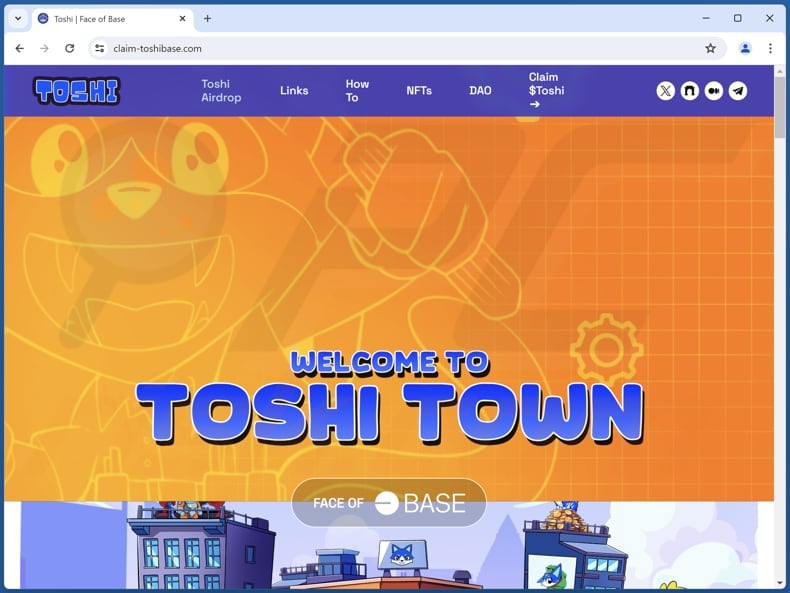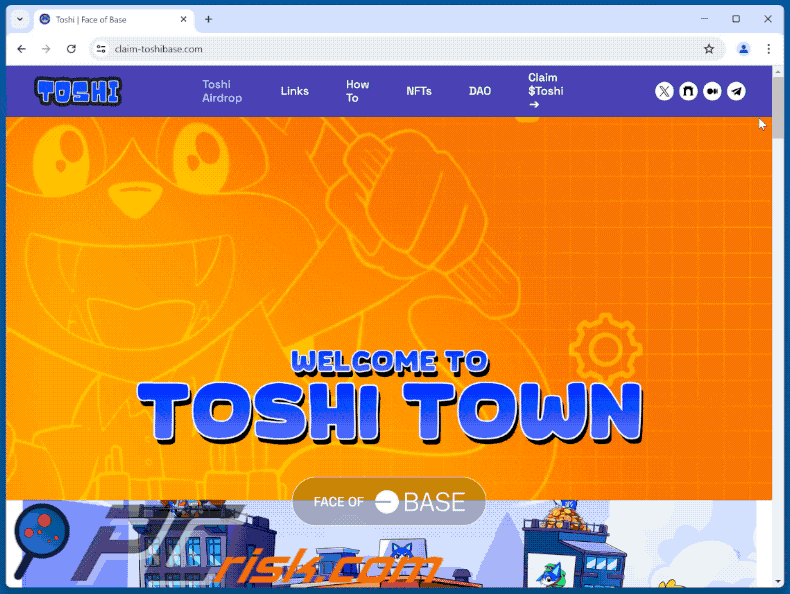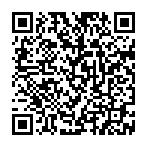How to identify fake giveaways like "CLAIM FREE $TOSHI"
![]() Written by Tomas Meskauskas on (updated)
Written by Tomas Meskauskas on (updated)
What is "CLAIM FREE $TOSHI"?
In our examination of the site, we discovered that it promotes the opportunity for individuals to obtain free cryptocurrency ($TOSHI). However, this scheme is among many designed to steal cryptocurrency from victims. Users are strongly recommended to disregard such pages to prevent financial loss and other possible complications.

"CLAIM FREE $TOSHI" scam in detail
The scam page falsely claims that a Toshi airdrop is underway, offering users the chance to claim free $Toshi tokens. It prompts users to connect their wallets to check eligibility and make a claim. However, this is a deceptive tactic to trick users into signing a malicious contract by "connecting" their wallets, leading to cryptocurrency theft.
After "connecting" a wallet (signing a malicious contract), a cryptocurrency drainer is activated. This drainer is designed to autonomously transfer cryptocurrency from the victim's wallet to the scammer's wallet, resulting in the immediate loss of all funds deposited in the victims' wallets.
Regrettably, recovering funds after a cryptocurrency transfer to the scammer's account can prove exceptionally difficult. Cryptocurrency transactions are generally irreversible, and given the decentralized nature of many cryptocurrencies, victims may find it challenging to retrieve their lost funds.
Therefore, users should exercise utmost caution when encountering cryptocurrency giveaways (airdrops) and similar offers to avoid losing their digital assets and encountering other issues.
| Name | CLAIM FREE $TOSHI fake crypto giveaway |
| Threat Type | Phishing, Scam, Social Engineering, Fraud |
| Fake Claim | Users can receive cryptocurrency ($TOSHI) for free |
| Disguise | Legitimate cryptocurrency giveaway (airdrop) |
| Related Domain | claim-toshibase[.]com |
| Detection Names (claim-toshibase[.]com) | CyRadar (Malicious), Fortinet (Spam), Gridinsoft (Phishing), Full List Of Detections (VirusTotal) |
| Symptoms | Lack of official verification, unrealistic claims, too good-to-be-true promises. |
| Distribution methods | Compromised social media accounts, hijacked WordPress sites, rogue online pop-up ads, phishing emails, unwanted applications. |
| Damage | Loss of sensitive private information, monetary loss, identity theft, possible malware infections. |
| Malware Removal (Windows) | To eliminate possible malware infections, scan your computer with legitimate antivirus software. Our security researchers recommend using Combo Cleaner. |
Conclusion
In conclusion, this scam operates by enticing users with the promise of free cryptocurrency tokens through a purported airdrop. However, upon connecting their wallets, users unwittingly activate a malicious contract, leading to the automatic transfer of their cryptocurrency funds to the scammer's wallet.
It underscores the critical importance of exercising caution and vigilance when engaging with online platforms or offers that request access to cryptocurrency wallets or personal information, to avoid falling prey to such scams and safeguard one's financial assets and privacy.
Examples of similar scams are "Telegram Giveaway TON", "Claim $ORA", and "Zora Mint".
How did I open a scam website?
Fraudsters employ a range of strategies to lure potential victims. Typically, they hijack social media accounts and WordPress sites to direct users to scam websites containing cryptocurrency drainers. Rogue advertising networks, found mostly on illegal streaming platforms or torrent sites, are another channel commonly used to promote scams.
Moreover, individuals may encounter scams through misleading advertisements, pop-ups, or other content on dubious sites (or notifications from websites of this kind). Additionally, scammers use phishing emails to lure users into opening fraudulent pages. Sometimes, dubious apps present on computers can open pages hosting scams.
How to avoid visiting scam pages?
Always scrutinize URLs carefully before clicking on links, ensuring they match the official website. Exercise caution when encountering ads, buttons, or pop-ups, particularly on dubious pages, and do not permit such pages to show notifications. Handle emails with care, especially those containing links or attachments from unknown senders or appearing irrelevant or unexpected.
Download apps exclusively from official sources like official websites or trusted app stores and promptly uninstall any suspicious programs already installed on devices. If your computer is already infected with unwanted apps, we recommend running a scan with Combo Cleaner Antivirus for Windows to automatically eliminate them.
The appearance of "CLAIM FREE $TOSHI" scam (GIF):

Instant automatic malware removal:
Manual threat removal might be a lengthy and complicated process that requires advanced IT skills. Combo Cleaner is a professional automatic malware removal tool that is recommended to get rid of malware. Download it by clicking the button below:
▼ DOWNLOAD Combo Cleaner
By downloading any software listed on this website you agree to our Privacy Policy and Terms of Use. To use full-featured product, you have to purchase a license for Combo Cleaner. 7 days free trial available. Combo Cleaner is owned and operated by Rcs Lt, the parent company of PCRisk.com read more.
Quick menu:
- What is CLAIM FREE $TOSHI fake crypto giveaway?
- How to identify a pop-up scam?
- How do pop-up scams work?
- How to remove fake pop-ups?
- How to prevent fake pop-ups?
- What to do if you fell for a pop-up scam?
How to identify a pop-up scam?
Pop-up windows with various fake messages are a common type of lures cybercriminals use. They collect sensitive personal data, trick Internet users into calling fake tech support numbers, subscribe to useless online services, invest in shady cryptocurrency schemes, etc.
While in the majority of cases these pop-ups don't infect users' devices with malware, they can cause direct monetary loss or could result in identity theft.
Cybercriminals strive to create their rogue pop-up windows to look trustworthy, however, scams typically have the following characteristics:
- Spelling mistakes and non-professional images - Closely inspect the information displayed in a pop-up. Spelling mistakes and unprofessional images could be a sign of a scam.
- Sense of urgency - Countdown timer with a couple of minutes on it, asking you to enter your personal information or subscribe to some online service.
- Statements that you won something - If you haven't participated in a lottery, online competition, etc., and you see a pop-up window stating that you won.
- Computer or mobile device scan - A pop-up window that scans your device and informs of detected issues - is undoubtedly a scam; webpages cannot perform such actions.
- Exclusivity - Pop-up windows stating that only you are given secret access to a financial scheme that can quickly make you rich.
Example of a pop-up scam:

How do pop-up scams work?
Cybercriminals and deceptive marketers usually use various advertising networks, search engine poisoning techniques, and shady websites to generate traffic to their pop-ups. Users land on their online lures after clicking on fake download buttons, using a torrent website, or simply clicking on an Internet search engine result.
Based on users' location and device information, they are presented with a scam pop-up. Lures presented in such pop-ups range from get-rich-quick schemes to fake virus scans.
How to remove fake pop-ups?
In most cases, pop-up scams do not infect users' devices with malware. If you encountered a scam pop-up, simply closing it should be enough. In some cases scam, pop-ups may be hard to close; in such cases - close your Internet browser and restart it.
In extremely rare cases, you might need to reset your Internet browser. For this, use our instructions explaining how to reset Internet browser settings.
How to prevent fake pop-ups?
To prevent seeing pop-up scams, you should visit only reputable websites. Torrent, Crack, free online movie streaming, YouTube video download, and other websites of similar reputation commonly redirect Internet users to pop-up scams.
To minimize the risk of encountering pop-up scams, you should keep your Internet browsers up-to-date and use reputable anti-malware application. For this purpose, we recommend Combo Cleaner Antivirus for Windows.
What to do if you fell for a pop-up scam?
This depends on the type of scam that you fell for. Most commonly, pop-up scams try to trick users into sending money, giving away personal information, or giving access to one's device.
- If you sent money to scammers: You should contact your financial institution and explain that you were scammed. If informed promptly, there's a chance to get your money back.
- If you gave away your personal information: You should change your passwords and enable two-factor authentication in all online services that you use. Visit Federal Trade Commission to report identity theft and get personalized recovery steps.
- If you let scammers connect to your device: You should scan your computer with reputable anti-malware (we recommend Combo Cleaner Antivirus for Windows) - cyber criminals could have planted trojans, keyloggers, and other malware, don't use your computer until removing possible threats.
- Help other Internet users: report Internet scams to Federal Trade Commission.
Frequently Asked Questions (FAQ)
What is a crypto scam?
A cryptocurrency scam involves deceptive tactics aimed at tricking unsuspecting individuals into compromising their cryptocurrency wallets, transferring cryptocurrency to scammers, or engaging in similar actions under false pretenses.
Is it possible to retrieve lost crypto funds?
Cryptocurrency transactions are predominantly irreversible, making it virtually impossible to reclaim funds once they've been transferred to a scammer's wallet.
Why do I encounter crypto scams?
Scammers employ various tactics to disseminate their scams. These methods include phishing emails, compromised social media accounts, hijacked websites (e.g., WordPress sites), misleading advertisements, pop-ups on questionable websites, and the utilization of rogue advertising networks.
Will Combo Cleaner protect me from scams?
Combo Cleaner provides website analysis to flag potential scams. Upon detecting fraudulent activity, users are promptly notified, and access restrictions are swiftly enforced to mitigate risks.


▼ Show Discussion